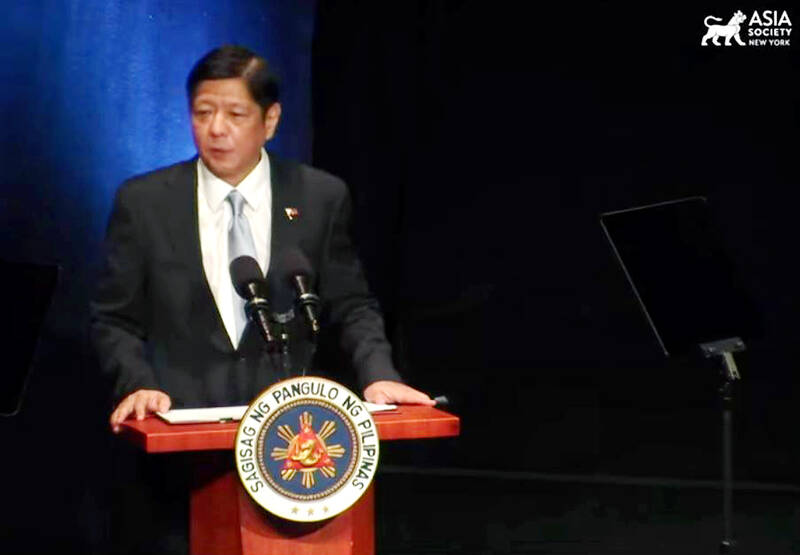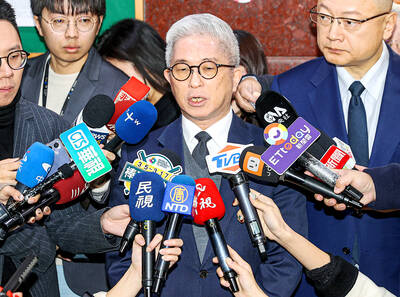Taiwan has thanked Philippine President Ferdinand Marcos Jr for a speech he delivered in New York on Friday, in which he appealed for a peaceful solution to tensions in the Taiwan Strait.
The Ministry of Foreign Affairs said in a statement yesterday that Taiwan remains grateful that the Philippine leader is paying attention to cross-strait peace and stability.
The speech demonstrated that Beijing’s intensifying military provocations in the region, over the past two months in particular, are a concern to neighboring countries, the ministry said.

Photo: Screen grab from YouTube
It called on the international community to condemn what it called China’s unilateral actions in destabilizing the cross-strait “status quo,” and to jointly prevent the expansion of authoritarianism in the region.
In his speech at a meeting of the Asia Society, Marcos said that the Philippines’ candidacy for a temporary seat on the UN Security Council starting from 2027 is “premised on my country’s long years of experience in building peace and forging new paths of cooperation.”
“In this context, we are certainly concerned about rising tensions in the Taiwan Strait, just north of the Philippines,” he said.
Although Manila is to maintain its diplomatic recognition of Beijing over Taipei, the Philippines would always pursue peaceful resolutions of disputes involving China and Taiwan, Marcos said.
“We urge all parties involved to exercise maximum restraint. Dialogue and diplomacy must prevail,” he said.
During a question-and-answer session, Marcos was asked by former Australian prime minister Kevin Rudd, president and CEO of the Asia Society, about his country’s future relations with Japan.
Marcos replied that he had recently met with Japanese Prime Minister Fumio Kishida, and they discussed a number of issues, including Taiwan.
“I think it’s no surprise to anyone that they are terribly, terribly concerned, not only of China, but because of the recent events, we have focused on the Taiwan situation,” he said.
“The visit of the United States House [of Representatives] Speaker Nancy Pelosi to Taiwan sort of highlighted once again the simmering tensions that as I said were beneath the surface, but now have surfaced out into the open,” he said.
Tensions between Washington and Beijing were heightened after Pelosi’s 19-hour visit to Taipei early last month, which was followed by large-scale Chinese military drills around Taiwan.

Conflict with Taiwan could leave China with “massive economic disruption, catastrophic military losses, significant social unrest, and devastating sanctions,” a US think tank said in a report released on Monday. The German Marshall Fund released a report titled If China Attacks Taiwan: The Consequences for China of “Minor Conflict” and “Major War” Scenarios. The report details the “massive” economic, military, social and international costs to China in the event of a minor conflict or major war with Taiwan, estimating that the Chinese People’s Liberation Army (PLA) could sustain losses of more than half of its active-duty ground forces, including 100,000 troops. Understanding Chinese

AGING: As of last month, people aged 65 or older accounted for 20.06 percent of the total population and the number of couples who got married fell by 18,685 from 2024 Taiwan has surpassed South Korea as the country least willing to have children, with an annual crude birthrate of 4.62 per 1,000 people, Ministry of the Interior data showed yesterday. The nation was previously ranked the second-lowest country in terms of total fertility rate, or the average number of children a woman has in her lifetime. However, South Korea’s fertility rate began to recover from 2023, with total fertility rate rising from 0.72 and estimated to reach 0.82 to 0.85 by last year, and the crude birthrate projected at 6.7 per 1,000 people. Japan’s crude birthrate was projected to fall below six,

WARNING: If the defense budget is not approved by the legislature, systems such as the Harpoon missile coastal defense system would be impacted, Hsu Szu-chien said The armed forces have response protocols for a wide range of sudden contingencies, including the “Wan Chun Plan” to protect the head of state, the Ministry of National Defense said yesterday. After US President Donald Trump on Saturday launched a series of airstrikes in Venezuela and kidnapped deposed Venezuelan president Nicolas Maduro, concerns have been raised as to whether China would launch a similar “decapitation strike” on Taiwan. The armed forces regularly coordinate with government agencies and practice drills to ensure preparedness for a wide range of scenarios, Vice Minister of National Defense Hsu Szu-chien (徐斯儉) told reporters before a meeting at

Russia sent a submarine to escort an empty oil tanker that the US military has been pursuing and attempting to seize for weeks, US media reported on Tuesday. The US has been chasing the oil tanker, formerly known as the Bella 1, since it evaded a US blockade around Venezuela and thwarted a US Coast Guard attempt to board it last month. Since being pursued by the US Coast Guard, the vessel has switched its registration to Russia, changed its name to the Marinera and the tanker’s crew reportedly painted a Russian flag on the tanker last month. It had been en route